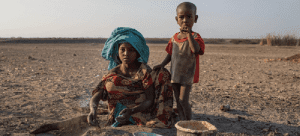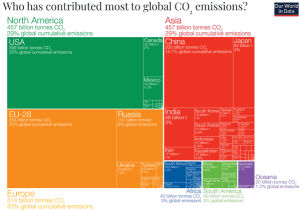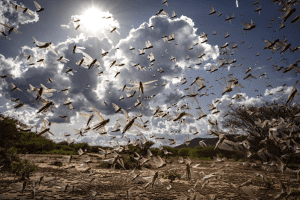Climate change is a global crisis, we are all in this together. But we are not in this together equally. Climate change is mainly caused by greenhouse gas emission of developed nations. However, developing countries, young people and women are much more affected by climate change. Because of climate change, African countries and people will suffer more climate extremes such as floods, droughts, landslides etc.

Climate extremes are mostly a result of actions from developed countries and corporations. Without adequate and sudden actions, a great inequality will fall upon us. It is high time to highlight this climate injustice.
It is a fact that global warming, and the resulting global climate change, is caused by anthropogenic greenhouse gas emissions. The majority of these emissions propelled the development of rich Western nations. For example, the USA (25%), EU (22%), Russia (6%) and Japan (4%) combined account for 57% of the total global emissions, but only have ~13% of the global population. Oppositely, all African nations combined have emitted 3% of the total global greenhouse gas emissions, but they house 17% of the global population.
These high-polluting countries have eaten more than their fair share of the pie, and they benefitted vastly from it. Moreover, by disproportionally emitting greenhouse gasses these countries have (i) taken away the possibility for other, still developing, nations to use emissions for their own development, and (ii) are causing environmental damages in countries all over the world.

The Intergovernmental Panel on Climate Change (IPCC) reports are clear, developing countries are much more vulnerable to climate change and its impacts than developed nations. Poor countries, which did very little to contribute to climate change, are the ones that are suffering and will suffer the most. For example, because of climate change 65% of the cultivatable land in the African Sahel has degraded, resulting in mass migration and food insecurity. Currently, 40 million people risk severe food insecurity in the region, and millions have already migrated.
Reduced food security, increased water scarcity, and the associated increase in competition for these resources are suspected to have added to the rise of violent terrorist groups such as Boko Haram in West Africa. Other examples include, floods (2020), droughts (2022) and locust swarms (2019-2021) in East-Africa and disappearing mountain glaciers all over Africa, all of which are (partially) attributable to climate change. Moreover, climate change is projected to push tens of millions more Africans into extreme poverty by 2030. Africa is suffering disproportionally because of climate change, developed countries need to take their responsibilities and combat these humanitarian crises.
Developed nations need to reach the status of net-zero carbon emissions as soon as possible. The less they emit, the more we can constrain the effects of climate change and the more room other countries get for emitting. Likewise, developed countries should help finance the sustainable development of developing countries and their efforts towards climate adaptation.
Lawsuits have been arising where individual people, organisations and countries are suing polluting countries and companies for the ecological damages they have caused. These lawsuits can be a good place to force polluters to compensate for their actions, and help developing countries adapt to climate change, if they are unwilling to do so.

Aside from geographical disparity, we are also facing a generational inequality. Young people will suffer much more from the consequences of climate change than older generations. A baby born in Africa in 2021 will suffer on average three times more heatwaves, two times more droughts and two times more river floods than their grandparents born in 1971, that is if we even manage to limit global warming to 1.5°C. Higher degrees of global warming result in even more climate extremes. Current pledges and promises are only sufficient to limit global warming to 2.4°C. Thus, young people stand to lose much more by inadequate and failing climate policies than their (grand)parents. Younger generations have contributed nothing to cause climate change but will suffer the worst consequences of it. The future of our children depends largely on the actions we now take.
Unfortunately, climate inequality does not stop here. Women and men experience climate change differently. In many African households, women are tasked with collecting and producing food, gathering water and cooking. Extreme events, enhanced by climate change, such as droughts and floods have a great impact on these tasks. We already know that the poor are more impacted more by climate change, and 70% of the world’s poor are women. Women will be more affected by climate change than men. By supporting gender equality in Africa, by providing resources to women so they can participate in climate change decision making and action at all levels, and by investing in comprehensive action plans including gender balance, we can fight against gender inequality in climate change.
Lastly, there is also inequality in climate change through funding for adaptation, mitigation and research between Africa and the developed world. For example, of the 546 billion USD global climate finance budget in 2018, only 2.5 % was spent in Sub-Saharan Africa. Concerns have been already raised by African countries in the UNFCCC, where committed funds for adaptation in Africa correspond to roughly 5$ per person on average per year, insignificant for a continent with such high vulnerability.
In addition, from 1990 to 2019, only 3.8% of global climate related research funding went to Africa-focused research, and 78% of this Africa-focused funding went to European and North American institutions, with only 14.5% going directly to African research institutions. A focus on targeted climate finance for research on the African continent would present an opportunity to improve climate change literacy while positioning climate change on national and regional development agendas.
Climate change is a global crisis, and we all stand to lose a lot. However, a select group of developed countries and companies are largely responsible for this. Meanwhile, poor countries, young people and women will bear the largest burden of this crisis. Many people could lose their lives, many could be forced to migrate, and others could see their livelihoods destroyed or impacted. However, all the efforts we put into combating climate change today, will bear their fruits numerous times over in the coming decades.
Africa has had little to do with causing climate change, yet climate change will impact the African people drastically. It is time to fight this inequality and ensure that developed countries put all their efforts into limiting climate change and into helping Africa adapt to and prepare for these unwelcome changes.
By Albert Nkwasa and Seppe Lampe
